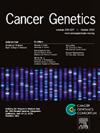Microsatellite instability and high tumor mutational burden detected by next generation sequencing are concordant with loss of mismatch repair proteins by immunohistochemistry
IF 2.1
4区 医学
Q4 GENETICS & HEREDITY
引用次数: 0
Abstract
Impairment of DNA mismatch repair function in neoplasms can be assessed by DNA-based methods to assess for high microsatellite instability (MSI-High) or immunohistochemical (IHC) analysis to assess for deficiency of mismatch repair proteins (dMMR). Neoplasms with mismatch repair deficiency often have high tumor mutational burden (TMB-High). MSI-High, dMMR, and TMB-High are all histology agnostic biomarkers for potential therapy using immune checkpoint inhibitors (ICI).
In this single center, retrospective study, our primary aim was to assess if NGS-based positive TMB/MSI findings are concordant with patient matched concurrent MMR IHC studies. In addition, we determined if positive TMB/MSI findings are attributable to genetic/epigenetic alterations of MMR genes. Finally, we explored potential associations between IHC, TMB and MSI findings and specific tumor types
We screened 4,258 patients in our database who had tumor-normal-testing with our institutional high-throughput NGS-based CLIA assay between Apr 1, 2021-August 31, 2022 for TMB and MSI. We identified 65 patients who had neoplasms with documented TMB-High/MSI-High (n = 59) or TMB-High/MSI-Undetermined (n = 6) results as well as concurrent IHC results for MMR proteins [colorectal (n = 25), endometrial (n = 28), prostatic (n = 7), urothelial (n = 3), other (n = 5)]. The concordance between positive NGS TMB/MSI and MMR results was 98 %. Genetic/epigenetic alterations of MMR genes were documented in 78 % of the neoplasms. IHC studies for dMMR proteins revealed loss of MLH1/PMS2 (n = 33), MSH2/MSH6 (n = 14), MLH1/MSH2/PMS2 (n = 1), MLH1 (n = 1), MSH2 (n = 2), MSH6 (n = 6) and PMS2 (n = 6). All six prostatic neoplasms with dMMR had loss of MSH2/MSH6 (p < 0.0001).
We conclude that neoplasms with positive results for TMB/MSI are highly concordant with positive dMMR results. Genetic/epigenetic alterations in the MMR genes are an underlying reason for most positive findings. The association of MSH2/MSH6 loss with prostatic neoplasms is of in-terest, but sample size is limited, and further studies are warranted to address this association
下一代测序检测到的微卫星不稳定性和高肿瘤突变负荷与免疫组化发现的错配修复蛋白缺失是一致的。
肿瘤中DNA错配修复功能的损害可以通过基于DNA的方法来评估高微卫星不稳定性(MSI-High)或免疫组织化学(IHC)分析来评估错配修复蛋白(dMMR)的缺乏。错配修复缺陷的肿瘤通常具有较高的肿瘤突变负荷(TMB-High)。MSI-High、dMMR和TMB-High都是使用免疫检查点抑制剂(ICI)进行潜在治疗的组织学不可知的生物标志物。在这项单中心回顾性研究中,我们的主要目的是评估基于ngs的TMB/MSI阳性结果是否与患者匹配的同时MMR IHC研究一致。此外,我们确定TMB/MSI阳性结果是否可归因于MMR基因的遗传/表观遗传改变。最后,我们探讨了IHC、TMB和MSI结果与特定肿瘤类型之间的潜在关联。我们在数据库中筛选了4258名患者,这些患者在2021年4月1日至2022年8月31日期间使用了基于ngs的机构高通量CLIA检测TMB和MSI。我们确定了65例肿瘤患者,他们的TMB-High/MSI-High (n = 59)或TMB-High/MSI-Undetermined (n = 6)结果以及同时的MMR蛋白IHC结果[结直肠(n = 25),子宫内膜(n = 28),前列腺(n = 7),尿路上皮(n = 3),其他(n = 5)]。NGS TMB/MSI阳性与MMR结果的一致性为98%。78%的肿瘤记录了MMR基因的遗传/表观遗传改变。dMMR蛋白的免疫组化研究显示MLH1/PMS2 (n = 33)、MSH2/MSH6 (n = 14)、MLH1/MSH2/PMS2 (n = 1)、MLH1 (n = 1)、MSH2 (n = 2)、MSH6 (n = 6)和PMS2 (n = 6)的缺失。6例dMMR前列腺肿瘤均有MSH2/MSH6的缺失(p < 0.0001)。我们得出结论,TMB/MSI阳性结果的肿瘤与dMMR阳性结果高度一致。MMR基因的遗传/表观遗传改变是大多数阳性结果的潜在原因。MSH2/MSH6缺失与前列腺肿瘤的关系是一个有趣的问题,但样本量有限,需要进一步的研究来解决这一关系。
本文章由计算机程序翻译,如有差异,请以英文原文为准。
求助全文
约1分钟内获得全文
求助全文
来源期刊

Cancer Genetics
ONCOLOGY-GENETICS & HEREDITY
CiteScore
3.20
自引率
5.30%
发文量
167
审稿时长
27 days
期刊介绍:
The aim of Cancer Genetics is to publish high quality scientific papers on the cellular, genetic and molecular aspects of cancer, including cancer predisposition and clinical diagnostic applications. Specific areas of interest include descriptions of new chromosomal, molecular or epigenetic alterations in benign and malignant diseases; novel laboratory approaches for identification and characterization of chromosomal rearrangements or genomic alterations in cancer cells; correlation of genetic changes with pathology and clinical presentation; and the molecular genetics of cancer predisposition. To reach a basic science and clinical multidisciplinary audience, we welcome original full-length articles, reviews, meeting summaries, brief reports, and letters to the editor.
 求助内容:
求助内容: 应助结果提醒方式:
应助结果提醒方式:


